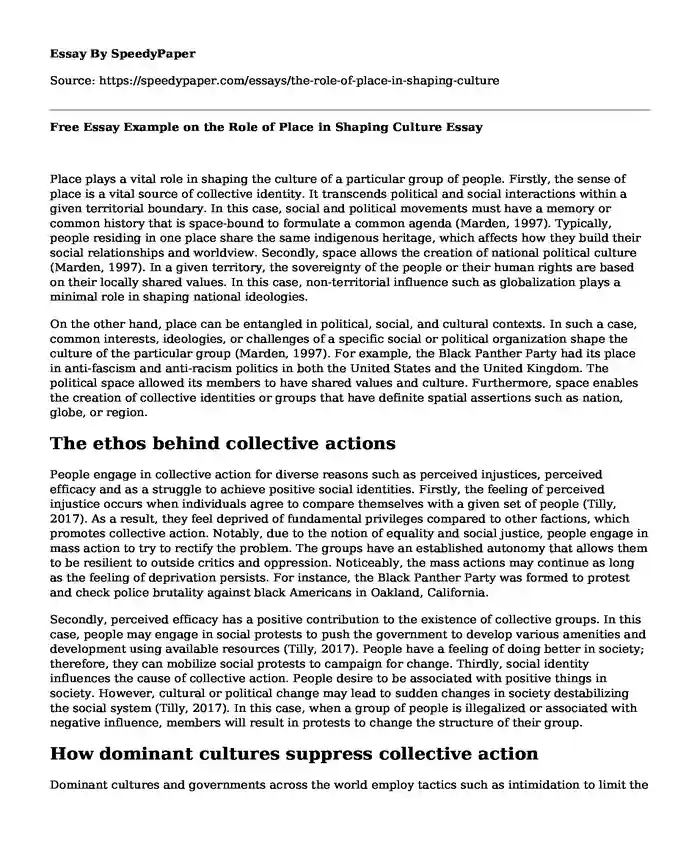Place plays a vital role in shaping the culture of a particular group of people. Firstly, the sense of place is a vital source of collective identity. It transcends political and social interactions within a given territorial boundary. In this case, social and political movements must have a memory or common history that is space-bound to formulate a common agenda (Marden, 1997). Typically, people residing in one place share the same indigenous heritage, which affects how they build their social relationships and worldview. Secondly, space allows the creation of national political culture (Marden, 1997). In a given territory, the sovereignty of the people or their human rights are based on their locally shared values. In this case, non-territorial influence such as globalization plays a minimal role in shaping national ideologies.
On the other hand, place can be entangled in political, social, and cultural contexts. In such a case, common interests, ideologies, or challenges of a specific social or political organization shape the culture of the particular group (Marden, 1997). For example, the Black Panther Party had its place in anti-fascism and anti-racism politics in both the United States and the United Kingdom. The political space allowed its members to have shared values and culture. Furthermore, space enables the creation of collective identities or groups that have definite spatial assertions such as nation, globe, or region.
The ethos behind collective actions
People engage in collective action for diverse reasons such as perceived injustices, perceived efficacy and as a struggle to achieve positive social identities. Firstly, the feeling of perceived injustice occurs when individuals agree to compare themselves with a given set of people (Tilly, 2017). As a result, they feel deprived of fundamental privileges compared to other factions, which promotes collective action. Notably, due to the notion of equality and social justice, people engage in mass action to try to rectify the problem. The groups have an established autonomy that allows them to be resilient to outside critics and oppression. Noticeably, the mass actions may continue as long as the feeling of deprivation persists. For instance, the Black Panther Party was formed to protest and check police brutality against black Americans in Oakland, California.
Secondly, perceived efficacy has a positive contribution to the existence of collective groups. In this case, people may engage in social protests to push the government to develop various amenities and development using available resources (Tilly, 2017). People have a feeling of doing better in society; therefore, they can mobilize social protests to campaign for change. Thirdly, social identity influences the cause of collective action. People desire to be associated with positive things in society. However, cultural or political change may lead to sudden changes in society destabilizing the social system (Tilly, 2017). In this case, when a group of people is illegalized or associated with negative influence, members will result in protests to change the structure of their group.
How dominant cultures suppress collective action
Dominant cultures and governments across the world employ tactics such as intimidation to limit the effects of collective actions. In most cases, governments utilize police departments to beat, shoot, or use excessive force against protestors to curb their activities (Kalyvas & Kocher, 2007). The brutal acts serve as a form of intimidation to demotivate participants. Moreover, regimes may criminalize a group and target its leaders. In the United States, the Federal Bureau of Investigation penalized the Black Panther Party to limit its growing influence. On another case, in 2011, the Oakland Police Department used excessive force and brutal means to disperse the Occupy Oakland protestors.
References
Kalyvas, S. N., & Kocher, M. A. (2007). How "Free" is Free Riding in civil wars?: Violence, insurgency, and the collective action problem. World politics, 59(2), 177-216.
Marden, P. (1997). Geographies of dissent: globalization, identity, and the nation. Political Geography, 16(1), 37-64.
Tilly, C. (2017). From mobilization to revolution. In Collective Violence, Contentious Politics, and Social Change (pp. 71-91). Routledge.
Cite this page
Free Essay Example on the Role of Place in Shaping Culture. (2022, Oct 24). Retrieved from https://speedypaper.com/essays/the-role-of-place-in-shaping-culture
Request Removal
If you are the original author of this essay and no longer wish to have it published on the SpeedyPaper website, please click below to request its removal:
- Latin-America Research Paper Example
- Essay Example on Gun Violence and Video Games
- Essay Sample on Breast Lumps: Questions and Answers
- The Namesake - Summary and Analysis of the Novel
- Free Paper Sample: E-Commerce in Grocery Stores
- Essay Example Dedicated to Creative Hubs and Creative Tourism
- Reflection on 'Facing Up the American Dream'
Popular categories





